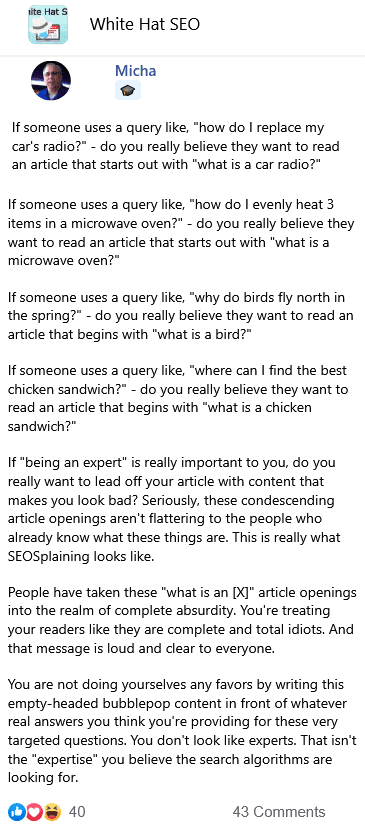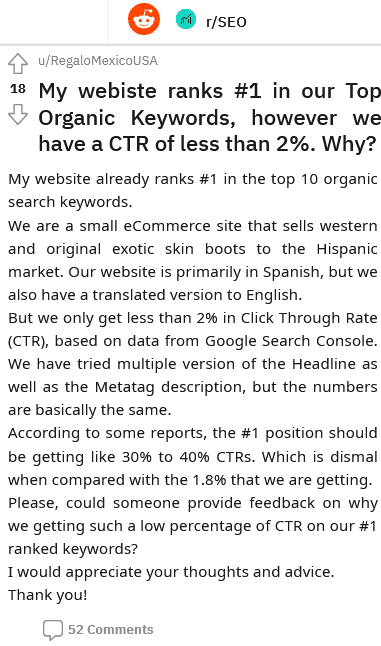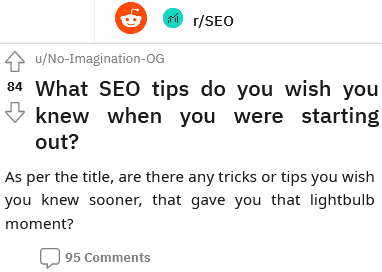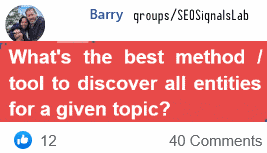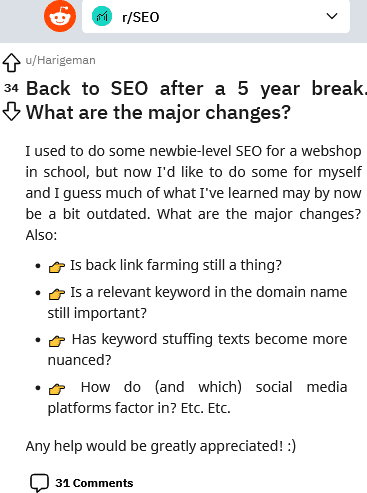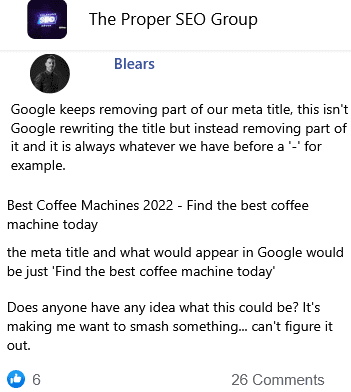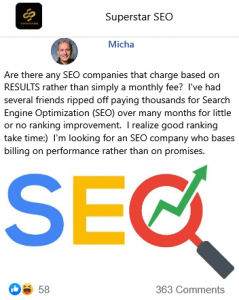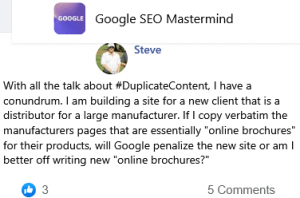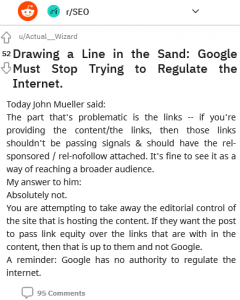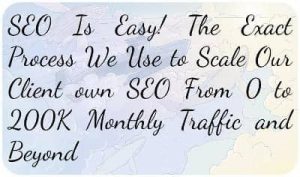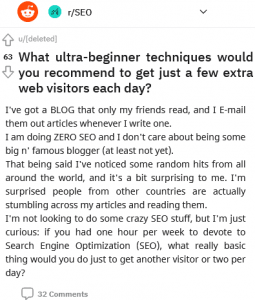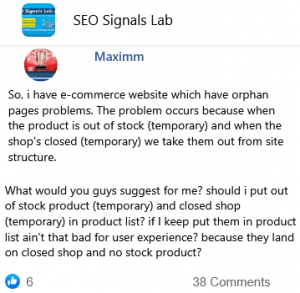If someone uses a query like, "how do I replace my car's radio?" – do you really believe they want to read an article that starts out with "what is a car radio?"
If someone uses a query like, "how do I evenly heat 3 items in a microwave oven?" – do you really believe they want to read an article that starts out with "what is a microwave oven?"
If someone uses a query like, "why do birds fly north in the spring?" – do you really believe they want to read an article that begins with "what is a bird?"
If someone uses a query like, "where can I find the best chicken sandwich?" – do you really believe they want to read an article that begins with "what is a chicken sandwich?"
If "being an expert" is really important to you, do you really want to lead off your article with content that makes you look bad? Seriously, these condescending article openings aren't flattering to the people who already know what these things are. This is really what SEOSplaining looks like.
People have taken these "what is an [X]" article openings into the realm of complete absurdity. You're treating your readers like they are complete and total idiots. And that message is loud and clear to everyone.
You are not doing yourselves any favors by writing this empty-headed bubblepop content in front of whatever real answers you think you're providing for these very targeted questions. You don't look like experts. That isn't the "expertise" you believe the search algorithms are looking for.
30 👍🏽7 💟3 🤭40
43 💬🗨
📰👈
I'm going to disagree with you there you don't know who is reading your article could be a beginner to someone advanced You want everyone to be on the same page about what the definitions are being used in your article since we don't have almany common ones and a lot of people don't know the history, of how something came to be.
So what is a microwave — if you're trying to do the history of microwaves is important. It's not condescending.
Now if you're not fully explaining some detail they may not have known that's not common that's different but giving details behind what something is? A lot of people don't know those details.
Of course as long as that's a short part of your article and you're using it to build onto more advanced concepts.
If a beginner is asking how to replace a car radio, the beginner alreadty knows what a car radio is. They are ubiquitous, as are most of the things that these badly written articles are about.
If you're targeting a question with content, the content should answer the question directly – that creates the best user experience.
If you really think there are people out there who don't know what a car radio is, then why not just write an article that introduces car radios to those (probably younger, less experienced) people?
Kristine » Micha
We're just going to agree to disagree whenever I write an article I said a base tone with basic information and define the definitions I'll be using in the article. My articles are well received and got good comments so I don't think most people are offended by that as long as you're not talking down to them.
Micha ✍️ 🎓 » Kristine
We can agree to disagree on this. But I don't link to articles that treat me like an idiot. Nor will I share them.
Kristine » Micha
Giving the people the basics of something before you get into the advanced portions of it is not treating people like their idiots.
Micha ✍️ 🎓 » Kristine
I'm pretty advanced in my knowledge of Search Engine Optimization (SEO). I assure you – I never finish reading any SEO article that starts out with a section header that says, "What is [X]".
And I'm confident there are many other people at our level who feel as I do.
Nor, when I'm searching on how to fix things around the home, do I finish reading articles that explain to me what a faucet or a toilet or a light bulb is before explaining how to fix it.
I've never come across any comment on the Web where someone expressed any appreciation for those superfluous introductory fluff paragraphs.
There's no benefit to the average human reader who already knows what the thing is (because they are looking to buy it, replace it, fix it, donate it, sell it, whatever).
All this extra content is being included "for SEO" -which means the search engines don't care for it and it adds no value.
If I really, honestly believe an article is too short and would benefit from some additional words, instead of explaining the obvious I'll throw in some additional tips or background information.
People just need to get to the point rather than make everyone scroll to the bottom of the page to read 1 paragraph.
Kristine » Micha
That's a very pejorative opinion on how other people might write something. I write the basics in there so the people know what we're talking about and we're talking about the same thing. I'm sorry that you hate it so much that's your preference that's fine, but my articles got generally a good comments, lots of likes and lots of shares — so I don't think a lot of people share your opinion that there should be nothing in there that gets us all in the same page.
That's not the same a fluff.
I find it ironic though for someone who spent so much time last week saying how we don't have the same definition for anything is so negative about people whob write trying to make sure that they have the same definition before they read the meat of the article.
Micha ✍️ 🎓 » Kristine
What can the average blogger say in 1 paragraph that Wikipedia hasn't already said?
Come on – if I'm insulted, and other people say THEY are insulted – at what point do you accept that this kind of writig is perceived as insulting?
I'm not talking about articles where people offer their own definition of something that's poorly defined. I'm talking about articles where people define the basic stuff that everyone pretty much already knows about.
How many SEO blog posts do you want to read where the first paragraph is titled, "What is Search Engine Optimization (SEO)
There's a place for "What is SEO" content. I'm saying it doesn't belong in every article about an SEO strategy or concept.
At some point, people leave the page because they don't want to read that stuff over and over again. We're being beaten over the head with it. It's not serving a useful purpose.
Kristine » Micha
I agree just fluff content isn't a good way of writing but inverted pyramid writing to get to a deeper understanding is actually a very common way of treating a topic.
There's a huge difference.
Micha ✍️ 🎓 » Kristine
There are very good writers who do this introductory stuff all the time. Sometimes they do it for me and I appreciate it.
But the SEO community has taken this formulaic approach that just kills all my interest in their content.
And what triggered my rant today was, in fact, an SEO article that I otherwise thought was very good (not so much for me but for other people). I just will not share that kind of stuff no matter how much good information it may include after the fluff introduction.
Kristine » Micha
I do agree that fluff isn't needed or necessary. Though don't be too hard on the writer the editor may have made them add it too. :S
Micha ✍️ 🎓 » Kristine
You have a point. I'm probably just being grumpy today. But I'm tired of having the same basic stuff explained to me over and over again.
Kristine » Micha
I get that and SEO can make us all grumpy at times 🙂
📰👈
Ian
I can only speak from my own personal point of view. And I 100% agree with you. You normally have to scroll to the mid/bottom part of an article to get your info.
But Google or anyone else isn't going to rank (not yet anyway) those short simple answers that people want.
They rank short, simple answers all the time. We call them "Featured Snippets".
Rizwan » Ian
Hey I was looking what you have mentioned.
I am planning to make pages with low words count (approx 150) that include query answer.
Can we rank pages with only 150 words in it?
Well I am going to do experiment.
Myron
same with YouTube videos taking 10 minutes for 10 sec answer, which they don't even answer. "it depends on your preferences". basically spammers
Dangnabit! You're right. I might rant about those next …
Roger
Google has realized that this degrades user experience which is why they've implemented context highlighting. When you click a link for a highly specific search, you're now scrolled to the section of the page that matches your query, and the suggested answer is highlighted.
Yes, and I hate scroll-to-text because it only adds another layer of friction to my Web browsing experience. I have landed on way too many articles that needed to provide context where the scroll-to-text feature skips over the context, and then I have to scroll up to read it.
So they're trying to fix one problem with a one-size-fits-all solution that creates another problem.
Honest Elo-akpo Emoghene
This is an interesting post.
What do you suggest?
Does one need to write a few hundred words that Google might not really care about?
I don't believe in that approach.
If you feel like you need to describe a radio to anyone who is reading an article about how to fix a broken radio, you really need to stop and ask yourself if YOU would want someone who came over to help you to do that.
"Hey, Rizwan! Thanks for asking me to come help you fix your radio. How long have you had a radio? 5 years? Great.
"Listen, just in case you don't know, a radio is a device we use to send signals through the air. The radio you have is actually a RECEIVER – and somewhere else on the planet there are TRANSMITTERS that send out the signals your receiver collects and interprets.
"You know, I think the problem with your radio is you just need to plug it in."
So, are you publishing copy that helps people solve problems or fulfill needs or are you writing a massive glossary?
This idea that you need to fill out a page with fluff content for the sake of the algorithms is nonsense. They don't work that way.
As for me, a typical human reader, when I want someone to explain to me what a radio is, I'll search for "what is a radio" and be glad I found a page that explains the concept to me without distractions like "where to buy the best portable radios in Los Angeles".
Rizwan » Micha
I was planning to make low text pages that includes only the answers what users wants to know in search. I will have to do some experiments. What if I make 100-300 words posts?
Micha ✍️ 🎓 » Rizwan
I don't believe this is a worthwhile experiment. People have been obsessed with "how many words" for years. It's always been an exasperating concept.
The "best number of words per page" started out as a kind of joke. Someone asked Jill Whalen at a conference how many words she thought people should use. She was exasperated and just off the top of her head said, "250?" And that number stuck for years.
Now we've got people publishing nonsense studies about how many words per page the top-ranking articles use. Those articles aren't ranking because of the number of words they use – and the target will keep growing larger as people keep trying to outrank each other with more words per page.
The fact the target moves should have told people this was a nonsense concept to begin with. In a few years, the average number of words per page top-ranking articles publish will be different from what it is today. And that will have nothing to do with what the search engine algorithms are looking for.
Rizwan » Micha
Thanks for great reply
📰👈
Albin
Almost hilarious that people are disagreeing with this. We've all had the experience of searching for something like a chocolate chip cookie recipe and having to wade through fluff 'content' such as "The History of Cookies" and "Cookie Baking Around the World". Incredible that Google still ranks these horrible user experiences.
What else are they going to rank? Everyone is writing the same formulaic stuff. And I've read a LOT of comments from cooking enthusiasts who are "fed up" with this fluff content. They hate it. I hate it.
It's been done to death, beyond that, and way too much for any metaphor to accurately express.
Albin true dat. As long as Google keeps on ranking these long ass articles people are going to keep on writing them. At this point 2-3k articles on every topic under the sun became a norm and there's nothing we can do about it. Try writing 300 word, straight-to-the point article and see how far it gets you…
Garachh
Either you believe or not but allmost everybody write for Google notnfor users but no one want to accept it.
long content generate more keywords and also decrease bounce rate that ultimately rank your keywords
Bounce rate has no effect on rankings.
And while I agree with you that most people in the industry are "writing for Google", I don't use these SEO formulas. They're unnecessary.
Longer content does rank for more keywords. I and a few others were telling people that 20 years ago (and it took the longest time for a majority of people to accept what we were saying). But just because you can rank for more keywords doesn't mean you should try to rank for highly competitive keywords – because you're climbing a steep hill when you do that repeatedly.
These introductory paragraphs flood the index with repetitious content. You only make it harder on yourselves the more you do this. It's like adding another pebble to the load you're bearing as you climb a mountain each time you do it.
Garachh » Micha
Bounce rate doesn't effect directly but indirectly Yes. because session, duration of visit, internal clicks are matter..Hence there is no any guidelines. i am writing here as per my experience.
Micha ✍️ 🎓 » Garachh
None of those things matter to the algorithms. They have no way of tracking them for every site.
📰👈
The future of SEO is Distinguishing What Things Commonly People Ask and What Seldom
Can a Popular Search Engine Distinguish the Intent of a Searcher, For Instance, Tutorial, Product Page
Some On-Page SEO Pillars: Selecting a Niche Then a Relevant Domain, Keyword Research, Silo, Skyscraper Link Technique
Expanding Topics in Search Engine Optimization | SEO Niche
Definitions of Search Intent and Definitions of Entities and Utilisation of Both
Discussion about Predictions for Search Engine Optimization SEO in 2022
Recommended Number of Words for an Article to Beat the Competition in Search Engine Result Pages SERPs
Used Python to Analyze Search Engine Result Pages SERPs
Is it Important to Learn Programming Languages for Search Engine Optimization (SEO)?
